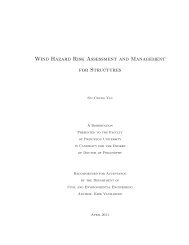Introduction to Fire Safety Management
Introduction to Fire Safety Management
Introduction to Fire Safety Management
Create successful ePaper yourself
Turn your PDF publications into a flip-book with our unique Google optimized e-Paper software.
<strong>Introduction</strong> <strong>to</strong> <strong>Fire</strong> <strong>Safety</strong> <strong>Management</strong><br />
➤ take samples of articles or substances<br />
➤ require articles or substances <strong>to</strong> be dismantled and<br />
tested as necessary<br />
➤ take possession of articles or substances as<br />
necessary<br />
➤ require any person <strong>to</strong> give them information, <strong>to</strong><br />
answer questions as necessary and <strong>to</strong> sign a declaration<br />
of the truth of their answers<br />
➤ inspect and take copies of documents<br />
➤ require facilities and assistance as necessary <strong>to</strong><br />
exercise their powers<br />
➤ do anything else necessary <strong>to</strong> exercise their powers.<br />
In addition <strong>to</strong> the above, appointed inspec<strong>to</strong>rs have the<br />
following specifi c powers:<br />
➤ the power <strong>to</strong> serve enforcement notices<br />
➤ the power <strong>to</strong> seize, destroy or render harmless any<br />
article or substance which the inspec<strong>to</strong>r believes is a<br />
cause of imminent danger or serious personal injury.<br />
15.3.16 Enforcement notices<br />
Where an inspec<strong>to</strong>r is of the opinion that a person is<br />
contravening a statu<strong>to</strong>ry provision, or has contravened<br />
a statu<strong>to</strong>ry provision in circumstances that make it likely<br />
that the contravention will continue or be repeated,<br />
they may serve an improvement notice requiring remedial<br />
action <strong>to</strong> be taken by a specifi ed date. The inspec<strong>to</strong>r<br />
may give written confi rmation of the remedial action<br />
required in the form of a schedule attached <strong>to</strong> the notice<br />
but they are not required <strong>to</strong> do so.<br />
Where an inspec<strong>to</strong>r is of the opinion that an activity<br />
being carried out or likely <strong>to</strong> be carried out involves, or<br />
will involve, a risk of serious personal injury, they may<br />
serve a prohibition notice requiring that the activity is<br />
suspended. The activity will be suspended either with<br />
immediate effect or after a specifi ed time. Again, the<br />
inspec<strong>to</strong>r may give written confi rmation of the remedial<br />
action required in the form of a schedule attached <strong>to</strong> the<br />
notice but they are not required <strong>to</strong> do so.<br />
A person on whom a notice has been served may<br />
appeal <strong>to</strong> the Employment Tribunal within 21 days of<br />
the service date. Where an appeal is lodged against an<br />
improvement notice, the notice is suspended pending<br />
the outcome of the appeal. In the case of a prohibition<br />
notice, the notice will stay in force pending the appeal<br />
unless otherwise directed by the Employment Tribunal.<br />
15.3.17 Sections 26 <strong>to</strong> 28<br />
These sections cover the power of the enforcing authority<br />
<strong>to</strong> indemnify their inspec<strong>to</strong>rs and provide detail<br />
regarding the obtaining and disclosure of information by<br />
the HSC, HSE and enforcing authorities.<br />
348<br />
15.3.18 Sections 29 <strong>to</strong> 32<br />
These sections were repealed.<br />
15.3.19 Section 33<br />
This section covers offences and the penalties that<br />
may be imposed in criminal proceedings for breaches<br />
of the HSW Act and supporting regulations. Examples<br />
of offences and penalties for both summary conviction<br />
(magistrates’ court) and conviction on indictment (cases<br />
taken in the Crown Courts) are summarised in Table 1.<br />
The enforcing authorities can initiate criminal<br />
proceedings regardless of whether any other action<br />
has been taken. There is no obligation placed upon<br />
the inspec<strong>to</strong>r <strong>to</strong> warn an offender of their intention <strong>to</strong><br />
prosecute although in practice prosecution is often only<br />
used when warnings and persuasion have been ignored.<br />
An inspec<strong>to</strong>r may prosecute either an individual person<br />
or the employer organisation, or both.<br />
15.3.20 Section 34<br />
This section extends the time for bringing summary proceedings,<br />
e.g. following delays for relevant inquiries or<br />
inquests.<br />
15.3.21 Section 35<br />
This section enables the location of plant or substances<br />
involving a breach of relevant statu<strong>to</strong>ry provisions <strong>to</strong> be<br />
regarded as the location of the breach for the purposes<br />
of enforcement.<br />
15.3.22 Section 36<br />
Where an offence committed by one person is due <strong>to</strong> the<br />
act or default of another person, this section enables the<br />
enforcing authority <strong>to</strong> initiate criminal proceedings against<br />
the other person for the offence regardless of whether any<br />
proceedings are taken against the fi rst person.<br />
15.3.23 Section 37<br />
Where an offence committed by a body corporate is<br />
committed with the consent or connivance or is attributable<br />
<strong>to</strong> the neglect of any direc<strong>to</strong>r, manager or similar<br />
offi cer of the body corporate, this section enables<br />
the enforcing authority <strong>to</strong> initiate criminal proceedings<br />
against both the corporate body and the individual person<br />
for the offence.<br />
15.3.24 Sections 38 and 39<br />
Under these sections the power <strong>to</strong> initiate criminal proceedings<br />
for summary trial in England and Wales is

















